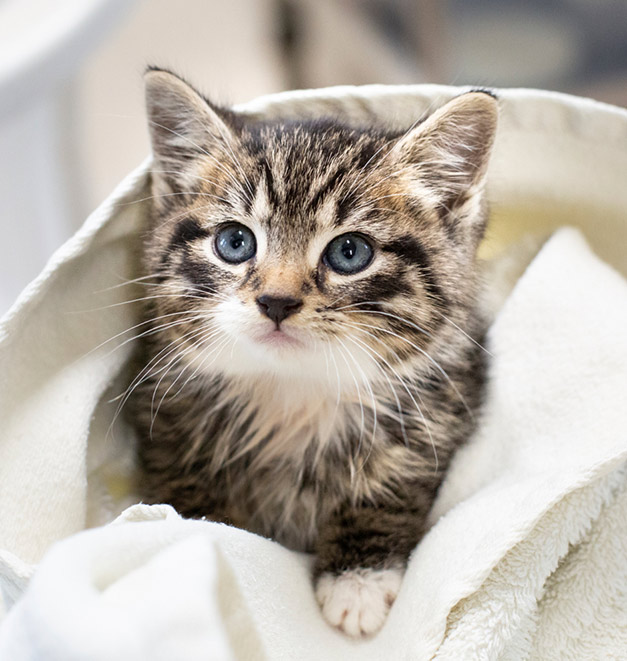Flea facts
Fleas are a type of external parasite. There are different species of fleas, such as dog fleas, cat fleas, rabbit fleas and human fleas. It's possible for many species of fleas to infest more than one host species.
- Fleas only suck blood from their hosts as adults. Adult fleas have mouthparts that are adapted for piercing skin and sucking blood from their host.
- A flea can live from between 14 days to a year, and a female can lay up to 50 eggs in one day - that's 1,500 in a lifetime!
- Some types of flea can leap more than a hundred times their own body length.
- It's estimated that 95 per cent of flea eggs, larvae and pupae live in the environment, not on your pet.

Shop pet healthcare and hygiene
Signs your pet might have fleas
There are a few things you can look out for that could mean your pet has fleas:
- Is your pet scratching?
- Areas of hair loss, bald or sore patches?
- Spots or scans?
- Redness and irritation?
- Thickened skin in areas (e.g. around ear edges)?
- Can you see tiny dark specks in its fur, or small browny-black insects scurrying about?
- Do you have any unaccounted for insect bites yourself?
If you've answered 'yes' to any of these questions, it could mean fleas.
Comb your pet to check for fleas
A good way to check if your pet has fleas is to groom them using a fine-toothed comb held over something white, like a piece of kitchen paper. Any fleas or flea droppings will be deposited on the surface. Add a few drops of water, and if the droppings turn reddish brown it's very likely your pet has fleas.
If you're still unsure if your pet has fleas or want to know what product to use, speak to your vet for the best advice.
Grooming helps spot fleas and ticks
Grooming your pet regularly has many benefits and will improve the bond between you. Even if, for example, you have a dog with short hair, you should still groom your dog regularly. Making this a regular routine will keep their fur cleaner and will show if your pet has any fleas or ticks.
Grooming your cat will also prevent matting and improve their circulation.
Flea treatment
It's essential to treat both your pet and your home, as fleas can survive in the environment without a host for many months. Flea treatment can easily be done at home, so here's how to do it:
- Flea treatments: prevent and get rid of fleas by regularly using flea treatment for your pets. See your vet for advice on the best flea products that will work for your pet.
- Treat quickly: If you spot fleas on your pet, treat them quickly, as they can give your cat or dog tapeworms and diseases (make sure you worm your pet as well).
- Clean bedding regularly and vacuum furniture, floors and skirting boards to help destroy fleas at each stage of their lifecycle.
- Throw away the dust bag from your vacuum after each use to prevent any flea eggs and larvae from developing.
- Treat regularly: you may need to treat your pet and home for fleas all year round if your home is centrally heated.
Only give your pet flea treatment that's been recommended for them, ideally one prescribed by your vet. Products suitable for one species may not be suitable for another. Some dog flea treatments contain permethrin, an insecticide that is safe for dogs but highly toxic to cats.
Many spot-on flea treatments (like those containing fipronil) have been found in high levels in UK waterways. These chemicals are very harmful to small aquatic animals and might also harm other species.
To protect the environment, it’s important to use these products correctly. Always follow the instructions on the product leaflet and apply the treatment to your pet as directed. Pets shouldn’t swim, be bathed, or go to the groomers for a few days after the treatment (please check the leaflet for details).
Make sure to dispose of the packaging properly in household waste, and use the product only on the species listed. Please talk to your vet about the best flea treatments for your pet and how often they should be used to help protect your pet, people, and the planet.
Flea bites and what they do
Flea bites can make your pet uncomfortable and itchy, but they can also bring a host of other problems:
- Allergic reactions: pets can be hypersensitive to flea saliva and suffer an allergic reaction.
- Blood loss: fleas feed on blood, so young or frail animals can become weak and even die as a result of blood loss.
- Tapeworm: flea larvae can become infected with tapeworm eggs. If your pet eats an infected flea it can become host to this parasite. If your pet has fleas you should also make sure your pet is treated for worms.
- Disease: fleas can also pass diseases to your pets. For example, myxomatosis is a serious disease in rabbits that can be spread by fleas.
Stay in touch
Sign up to receive our emails today. Get more pet care advice, hints and tips on helping wildlife, our latest news, rehoming success stories and more directly to your inbox.




